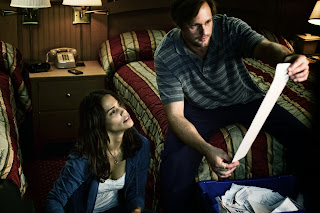Movie Review - Disconnect
 |
| Paula Patton (left) and Alexander Skarsgård lose their online identities and try to get them back. |
There are essentially three story lines that start off as three separate things and by the end they remain separate things but each do cross each others' path in one way or the other. The urge to have them narratively converge isn't satisfied, but what Stern does instead is have them converge emotionally. What Rubin does is have that emotional convergence be portrayed in the most powerful, visual way possible.
I wouldn't say that one of the three story lines is more important or takes precedence over the others. The three are equally balanced, but if I had to label one as the A-story, it would be the story involving the cyber-bullying. The B-story and C-story are the one involving online pornography and the one involving identity theft respectively.
Jason Bateman (Arrested Development) stars as Rich Boyd, a lawyer who's married to Lydia, played by Hope Davis (The Newsroom). They have two high school-age kids. One is a son named Ben Boyd, played by Jonah Bobo (Crazy, Stupid, Love). The other is a daughter Abby, played by Haley Ramm (Without a Trace). Ben is a kind of a goth kid in terms of the way he wears his hair and dresses, but he likes music like Sigur Ros and he makes sweet music himself on his keyboard and MacBook, but Ben hides the fact that he's been the victim of cyber-bullying at the hands of a fellow classmate named Jason Dixon, played by Colin Ford (Under the Dome).
Paula Patton (Precious) stars as Cindy Hull, a woman dealing with the death of her child by going onto a grief website. Alexander Skarsgård (True Blood) plays her husband Derek Hull, a business man who realizes that the two of them have become the victim of identity theft. After the police prove no help, Cindy and Derek hire a former cop who investigated computer crimes. That cop-turned-private eye is Jason Dixon's father, Mike Dixon, played by Frank Grillo (The Grey).
Max Thieriot (Bates Motel) co-stars as Kyle, a teenage sex worker. He's not exactly a prostitute. He does live, online porn and web camera interactions with men and women who want to watch him perform sex acts. Andrea Riseborough (Happy-Go-Lucky) plays Nina Dunham, a TV news reporter who wants to do a story on Kyle, so she befriends him. In the process, she develops feelings for him and he for her, but she stumbles into a human trafficking ring run by Kyle's so-called pimp that's under the investigation of the FBI.
With these three story lines, aside from the Internet crimes, the one thing they all share is this idea that the main characters suffer from loneliness and/or isolation. Through their own doing or not, the characters are cut off from others, not necessarily physically but emotionally cut off. The basest example is Rich ignoring his family at the dinner table by texting or emailing on his phone.
These go to extreme examples, which results in people getting hurt. Other movies have dealt with these extremes. Bateman early in the year starred in a film called Identity Thief, which explores in a ridiculously comedic way the same problem that befalls Cindy and Derek here. Bateman's character Rich experiences tangentially the same problem as in the documentary Catfish (2010). Young men and women who perform sex work either online or not have been depicted, in various indie films, mostly young men in various gay films.
Kyle who is the young man performing the sex work isn't gay but it's intimated that he has had to be pornographic for the pleasure of male clientele. It's intimated that Kyle's relationship with his pimp might be closer than what's ostensibly seen. The movie also intimates a relationship between two boys that's quasi-romantic. It's not gay but it shows two boys bonding in a more intimate way than I've seen any two people bond in an out-and-out romance. It's like a teenage, less vicious version of Jude Law and Clive Owen's online scene in Closer (2004).
Stern's screenplay also wants to say something about parenting or a parent's relationship with his or her child in the Internet-mobile-device culture of which they're all steeped. The screenplay favors the relationships between fathers and sons where it clearly depicts one father, Rich Boyd, being rather hands-off and another father, Mike Dixon, being rather hands-on. The women aren't given such short-shrift. An important component involves how men relate to women, or at least try to relate and often fail. This is exemplified in Cindy and Derek's storyline. Derek who is a former soldier harbors some stoicism as a result of being in war, possibly PTSD, which contribute to his inability to relate to his wife Cindy.
The acting performances are really great and Rubin balances each very well. It was also great to see Bateman in a more dramatic role than he usually does. He has a scene where he doesn't utter a word. We just watch his face as he and we read text messages and it's all very compelling. This is also probably the most thrilling film I've seen Bateman ever do and if it's any indication I hope he does more, and here's to more fictional films from Henry-Alex Rubin who prior to this was only known for his documentary Murderball (2005).
Five Stars out of Five.
Rated R for some graphic nudity, language, violence and drug use - some involving teens.
Running Time: 1 hr. and 55 mins.










Comments
Post a Comment